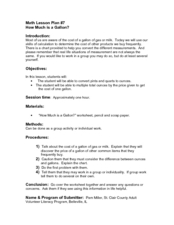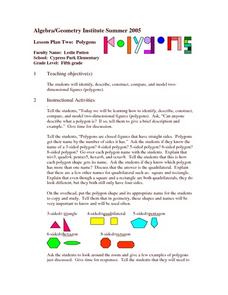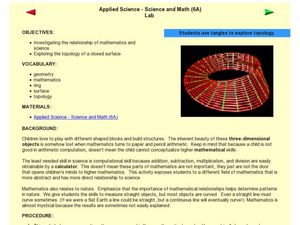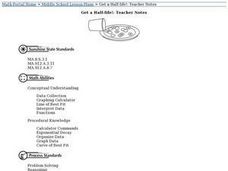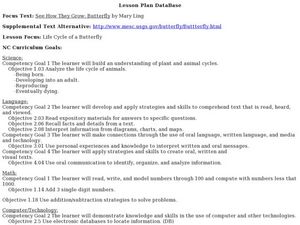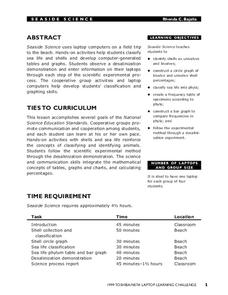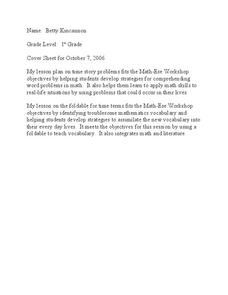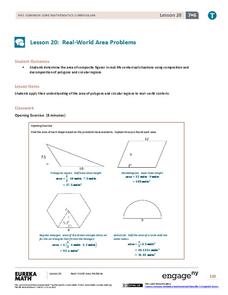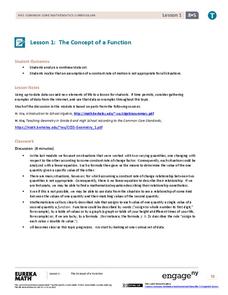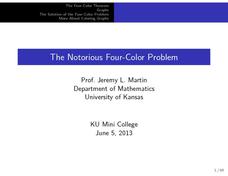Mary Pope Osborne, Classroom Adventures Program
Mummies in the Morning Egyptian pyramids, hieroglyphics
Visit the Magic Treehouse and take your class on a trip through time with a reading of the children's book Mummies in the Morning. Using the story to spark an investigation into Egyptian culture, this literature unit engages...
Curated OER
How Much Is A Gallon?
By engaging in real life examples, learners practice measurement and conversion skills. They review a chart comparing pints, quarts, and gallons. Then, they complete a worksheet involving prices per unit. For example, they calculate how...
Curated OER
Lesson Plan Two: Polygons
Learners explore the concept of polygons on a two-dimensional plane. They identify polygons in everyday life and draw different polygons according to their classification. Using a geoboard and geobands, they consrtuct polygons and even...
Curated OER
Math in Society
Twelfth graders determine probabilities of real-life events such as life expectancies, winning a lottery ticket and the break-even premium. They apply how life-expectation tables are used to estimate the probability that an individual...
Curated OER
Applied Science-Science and Math Lab
Young scholars explore magnification. In this scientific observation skills lesson, students observe sea life items and draw pictures of what they observe. Young scholars predict which lens will have the strongest magnification when...
Curated OER
Get a Half Life!
Eighth graders use M&M's to experiment with data. They use a graphing calculator to determine the best equation for their data; linear, quadratic or exponential. They analyze the data to find the half-life of their M&M's.
Curated OER
Count on Math
Students develop number sense up to a million. In this developing number sense up to a million lesson, students count their breaths in given time span. Students use blocks representing 10's and 100's to create a million. Students use...
Curated OER
How Does Your Garden Grow?
Students construct and maintain a school garden. In this gardening lesson plan, students plan the construction of the garden by writing letters to local businesses asking for supplies and materials; students build the garden using their...
Curated OER
A Day in the Life
Students inquire about the politics and culture of Ancient Rome. In this Ancient Rome project/unit, students research life during ancient Roman times and create a newspaper with articles on politics, sports, culture, and economics.
Curated OER
See how They Grow: Butterfly
Young scholars view butterflies and participate in a butterfly activity to learn needed vocabulary. In this butterfly life cycle lesson, students access prior knowledge of butterflies. Young scholars listen to a butterfly life cycle...
Curated OER
Museums in the Classroom Pumpkin Project
Students identify the 5 stages in the life cycle of a pumpkin. They create a model showing the correct order of pumpkin life stages. They explain a pumpkin's life cycle to a partner, using their model.
Curated OER
Seaside Science
Students research sea life using laptop computers. In this sea life lesson plan, students participate in a field trip to the beach and enter observations into their laptop computers. Students classify shells and sea life.
Curated OER
Codebreaker Math
Students solve addition and subtraction problems and decipher and write messages using a code. They read and discuss an informational fact sheet about the Navajo code talkers from World War II, and decode and re-code messages using math...
Curated OER
Horseshoe Crab Fun
Marine biology masters will meet the horseshoe crab and red knot shore birds that feast upon the crab eggs. Begin with a discussion and then have learners write postcards from each animal detailing their migration trips. A few math...
Curated OER
Time Story Problems
First graders solve story problems using an analog clock. In this time story problems lesson plan, 1st graders complete word problems on elapsed time and discuss their solutions.
EngageNY
Real-World Area Problems
Not all structures take the shape of a polygon. The 21st lesson in a series of 29 shows young mathematicians they can create polygons out of composite shapes. Once they deconstruct the structures, they find the area of the composite figure.
EngageNY
The Concept of a Function
Explore functions with non-constant rates of change. The first installment of a 12-part module teaches young mathematicians about the concept of a function. They investigate instances where functions do not have a constant rate of change.
EngageNY
Estimating Quantities
Apply the concept of magnitude to estimate values and compare numbers. The ninth lesson of the 15-part series asks learners to write numbers to their next greatest power of 10 and then make comparisons. Scholars begin to understand the...
Perkins School for the Blind
Student Store
Vocational training activities are extremely important for learners with intellectual or physical disabilities. Here is a great idea that will help your class become skilled at money handling, basic economic concepts, interpersonal...
Insurance Zebra
Insurance Curriculum for Middle and High School Teachers
Liability, deductible, premium ... what do these words mean, and how do they relate to insurance? Scholars complete a pre-test, matching vocabulary activity, and insurance timeline worksheet and become familiar with these terms. Next,...
Curated OER
The Notorious Four-Color Problem
Take a walk through time, 1852 to 2005, following the mathematical history, development, and solution of the Four-Color Theorem. Learners take on the role of cartographers to study a United States map that is to be colored. One rule: no...
Curated OER
Plot Your Course
High schoolers determine distance and direction on a nautical chart. In this nautical instructional activity, students identify obstacles and characteristics of common aid to navigation on a nautical chart.
Curated OER
Can You Count on Cans?
How can a canned food drive be connected to math? It's as simple as counting and organizing the cans! Children demonstrate their ability to sort non-perishable foods into categories that include soup cans, vegetable cans, boxed items,...
Curated OER
Counting Money and Making Change
Students count collections of coins and one-dollar bills. They solve problems and learn to use the dollar sign ($) with the decimal point to represent money amounts. This lesson is important as a foundation for future math concepts in...



